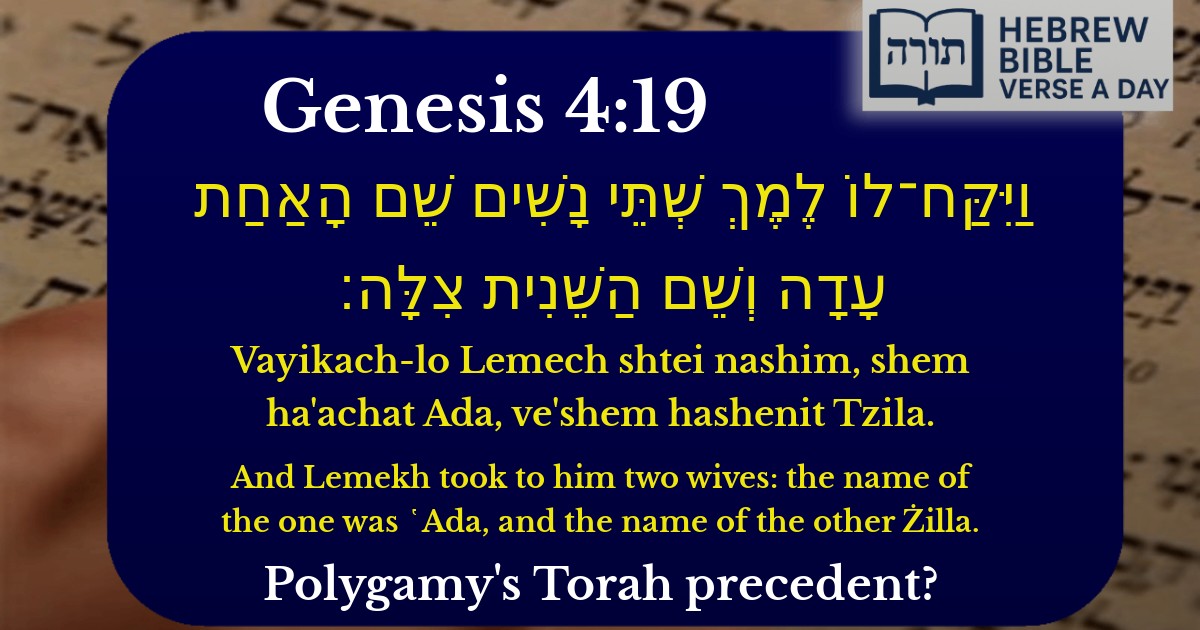Join Our Newsletter To Be Informed When New Videos Are Posted
Join the thousands of fellow Studends who rely on our videos to learn how to read the bible in Hebrew for free!
Hebrew Text
וַיִּקַּח־לוֹ לֶמֶךְ שְׁתֵּי נָשִׁים שֵׁם הָאַחַת עָדָה וְשֵׁם הַשֵּׁנִית צִלָּה׃
English Translation
And Lemekh took to him two wives: the name of the one was ῾Ada, and the name of the other Żilla.
Transliteration
Vayikach-lo Lemech shtei nashim, shem ha'achat Ada, ve'shem hashenit Tzila.
Hebrew Leining Text
וַיִּֽקַּֽח־ל֥וֹ לֶ֖מֶךְ שְׁתֵּ֣י נָשִׁ֑ים שֵׁ֤ם הָֽאַחַת֙ עָדָ֔ה וְשֵׁ֥ם הַשֵּׁנִ֖ית צִלָּֽה׃
Parasha Commentary
📚 Talmud Citations
This verse is quoted in the Talmud.
📖 Yevamot 63a
The verse is cited in a discussion about the practice of taking multiple wives and the implications of such actions.


Lemekh's Two Wives: Ada and Zilla
The verse (Bereishit 4:19) states that Lemekh took two wives, Ada and Zilla. This raises several questions that are addressed by traditional commentators:
Rashi's Explanation
Rashi (based on Bereishit Rabbah 23:2) explains that Lemekh took two wives for a specific purpose: one for procreation and one for marital relations. Ada was designated for bearing children, while Zilla was taken for beauty and companionship. This reflects a distortion of the proper marital relationship, as a wife should fulfill both purposes.
Midrashic Interpretation
The Midrash (Bereishit Rabbah 23:2) elaborates that Ada's name (עָדָה) comes from the root meaning "to pass" or "cease," indicating she would cease from bearing children after fulfilling her duty. Zilla's name (צִלָּה) relates to "shadow," suggesting she would always be at Lemekh's side like a shadow for companionship.
Moral Lesson
This episode is understood by commentators as demonstrating the moral decline before the Flood. The Ramban notes that Lemekh's behavior represents:
Names as Indicators of Character
The Malbim explains that the names themselves teach about the moral state of that generation. Ada (from עדה - testimony) suggests she was taken to testify to Lemekh's virility, while Zilla (from צל - shadow) indicates she was kept hidden for pleasure, showing the perversion of proper marital relations.
Halachic Perspective
While the Torah later permits multiple wives (with certain restrictions), this episode is viewed by many commentators as demonstrating why monogamy became the ideal. The Rambam (Hilchot Ishut 14:3) later codifies that a man should not take multiple wives unless he can properly provide for and treat them equally.